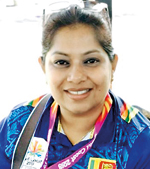Competitions to resume in July?

Dr. Daminda Attanayake
Athletes may have to live with the new norm of adhering to strict health guidelines during training because of the COVID-19 pandemic for at least for the next three years but the good news is that sports ministry physicians are looking at the possibility of competitions resuming as early as July.
“We are thinking if there is no community spread in the country, then we might actually look into the possibility of starting domestic competition by the end of July or the beginning of August but with lot of modifications in organising the event,” said Dr. Daminda Attanayake, technical head at the Institute of Sports Medicine (ISM) which comes under the Ministry of Sports.
The ISM formulated a comprehensive 12-page guideline for the safe resumption of sports activities recommending a phased out return to training of national pools from June 1.
“This is going to be changed from time to time according to the country’s situation as well as the research coming up. The foundation for the guidelines was formulated according to the health situation at that time in the country and the research available at the time,” she explained.
The first two phases are related to virtual individual training and then with the coach. Phase 3 allows small group training of less than 10 with the coach and supporting staff at the venue.
“Most of the athletes are training in phase 3. It is small group training or even whole team depending on the proposal that they are giving us,” she said.
“They were without physical fitness for about two months. That is why we are encouraging everybody to get into physical fitness actually. We are looking into domestic competition by end of July,” said Dr Attanayake, a qualified sports and exercise physican.
Apart from cricket, most sports bodies have not shown much enthusiasm to resume national pool training by June 1 for various reasons.
“That is quite understandable because all our training and competition locally is based on the international calendar. For the athletes, without seeing a goal there is no point in having a periodisation schedule for training because a training schedule is always based on periodisation,” said Dr Attanayake.
Asked about the practicality of resuming contact training in high-risk team sports such as rugby, she said: “It is not only me, even the WHO (World Health Organisation) and the international sports federations are not in a state to give a concrete answer. Right now what we can say is we have to adjust to the new norm for sports training and even for competition with some modifications.”
“Even if the vaccination is discovered, we might not be 100 per cent immunized to that vaccination. May be it could be just like the flu vaccine. Even though vaccine is given you might get it in a milder form. You have to get used to the new norm at least for another two to three years,” said Dr Attanayake who is South-East Asia Regional Expert Consultant on Global action plan development on physical activity for WHO. “Right now we are not allowing anybody to have contact unless they are on residential training. If they are residential, we are taking them as a cluster family,” she reiterated.
“When they come to contact training obviously we will suggest the pool to be residential. Maybe this will change once we are 100 per cent sure that the community spread is not there. On the other hand when we are going for international competition, we don’t know the other people. So we might have to adjust to new guidelines as how the international competitions will be conducted,” said Dr. Attanayake who has a Diploma in Advance Sport Management from the International Olympic Council.
Although the guidelines limits residential pool training to 15, Dr. Attanayake said they are flexible on the numbers depending on the proposals submitted by the national sports bodies.
“I don’t think the game rules will change drastically. We might have to do moderate changes in some of the rules. Actually things that people are practising as a norm,” said Dr. Attanayake who has been physician to national netball, hockey, fencing, cricket, football and swimming teams.
“The guidelines is not a strict rule or circular or act. Therefore if somebody has any other ideas on how to perform sports in a phased environment, do give us a proposal we might consider. We can definitely come to a good plan without comprising health of athlete or supporting staff,” she said.



